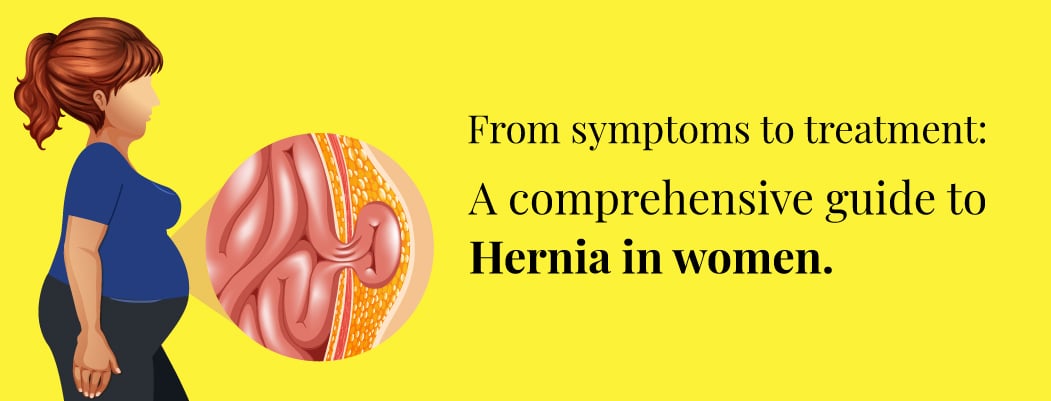Hernia in Women: Symptoms and Causes
December 30, 2022

Women’s Hernia: Their Causes
The development of hernias in women can be attributed to several factors. Here are some of the typical causes explained:
- Persistent cough
- Sneezing frequently
- High abdominal pressure
- Pregnancy
- Excessive straining with bowel motions
- Performing demanding activity
- Weakness in the abdomen in a particular region
Now that you know the typical factors that lead to hernias in men let’s take a closer look at why some specific types of hernias develop in women.
Females between the ages of 40 and 60 are more likely than males to have a number of femoral hernias. This is because as the muscles deteriorate, people in this age bracket are more likely to develop a hernia.
How common is a hernia?
Among all the hernias that develop:
- 75 to 80 per cent are femoral or inguinal.
- 2% have an incision or are ventral.
- 10% to 20% of neonates have umbilical disorders, of which 3 to 10% are close by themselves by age five.
- Other types make up 1 to 3%.
What causes hernias to form?
Weak muscles may have existed since birth, aging, and ongoing stress on the groin and abdominal areas are the causes of inguinal and femoral hernias. In addition, such strain may be brought on by severe exercise, obesity, pregnancy, chronic coughing, or straining on the toilet due to constipation.
An umbilical hernia can occur in adults who strain their abdomen, are overweight, have a chronic, labor-inducing cough, or have just given birth.
Although the specific source of Hiatal hernias is uncertain, age-related diaphragm weakness or pressure on the abdomen may be causing symptoms.
Types of Hernia in Female
1. Femoral Hernia
This is the hernia that appears most frequently in females. The femoral artery and other blood vessels are located in the femoral canal. When the tissue protrudes through the weak area in the abdomen near the groyne, a hernia develops in the femoral canal. The herniated tissue may pass through the gap and enter the thigh or groin.
2. Umbilical Hernia
Umbilical hernias are the second most prevalent kind of hernia in women. An umbilical hernia occurs when the abdominal wall stretches at the belly button during pregnancy. The tissue that extends from the navel can be seen. In newborns, this kind of hernia is also prevalent. Even if it’s not harmful, issues could arise if you don’t get this handled.
3. Hiatal Hernia
The hernia is not externally noticeable since it develops within. In cases of Hiatal hernias, the oesophagus’s lining of the upper stomach pushes through the hole in the diaphragm. Acid reflux and heartburn can occasionally coexist with hiatal hernia.
Hernias of other types include:
- Tissue that protrudes through an abdominal scar following a distant abdominal or pelvic operation is known as an incisional hernia.
- Fat tissue that protrudes through the abdominal wall between the navel and the lower section of the sternum is called an epigastric hernia (breastbone).
- Spigelian hernia: Below the navel, on the side of the abdominal muscle, the intestine pushes through the abdomen.
- Organs from the belly move into the chest through a hole in the diaphragm in the case of a diaphragmatic hernia.
Hernia in Women: Signs and Symptoms
Most of the time, a hernia is entirely asymptomatic. Usually, a woman’s hernia is discovered during a routine physical check. The following are some of the symptoms and warning indications that women may encounter when they acquire a hernia:
- From minor to excruciating pain
- Burning sensation near the hernia
When the hernia worsens, there may be some serious symptoms like being strangled. Some of them include the following:
- Severe discomfort
- Nausea and diarrhoea
- Unable to pass gas
- Worsening or sensitivity around the swelling
- Elevated heart rate
- Fever
- Redness surrounding the lump
How are hernias diagnosed?
A hernia is often detected as a protrusion that can be felt or seen during a physical examination. There are times when soft-tissue imaging, such as a CT scan, can make a precise diagnosis.
Which physician will diagnose a hernia?
Your doctor may identify a hernia. However, your doctor will typically recommend that you see a general surgeon for a surgery evaluation.
Home remedies for hernia
Following natural therapies can assist in relieving hernia symptoms in those who have been diagnosed:
1. Castor seed oil
This specific oil treats digestive issues. Castor oil aids in promoting healthy digestion and reducing stomach inflammation. So, to relieve the pain and to swell close to the affected area, create a castor seed oil pack and apply it to the stomach.
2. Aloe vera juice
This is beneficial for easing some hernia symptoms because of its anti-inflammatory and calming effects. Because of its health benefits, people commonly drink aloe vera juice. To lessen your chance of developing a hernia, drink this juice before each meal.
3. Ice cubes
There may be swelling and pain in the abdomen when you have a hernia. Ice packs cause constriction and lessen internal inflammation when placed on the affected area. Additionally, they frequently provide pain and bloating relief.
4. Ginger root
To relieve the pain and discomfort in your stomach, consume concentrated ginger juice or raw ginger. In addition, it strengthens your immune system. However, it limits the stomach’s ability to produce gastric juices, usually when there is a hiatal hernia.
5. Black pepper
Black pepper has a purpose beyond enhancing flavour. It promotes healing in the bodily sections damaged when the organ started to push through the cavity wall. Additionally, it can reduce acid reflux, aiding in treating a hernia’s bulging area.
6. Vegetable juice
Drinking a glass of vegetable juice made from carrots, spinach, onions, broccoli, and kale is among the most efficient natural treatments. Vegetables’ nutrition and anti-inflammatory properties aid in reducing the burning and uncomfortable hernia-related sensations.
7. Diet alert
Foods that are sour, acidic, or hard to digest should always be avoided. The primary factor is that this diet may cause the stomach lining to become even more inflamed, making it more difficult to recover.
List of foods to consume if you have a hernia:
- Carrot juice
- Orange juice
- Almonds
- Chia seeds
- Yoghurt
- Soy milk
- Almond milk
- Beans and carrots
- The sweet potato
- Green beans
- Several foods high in fibre include oatmeal, whole grains, beans, and legumes
- berries, apples, pears, different melons, and other non-citrus foods.
- Green tea
- Lean protein
How can a hernia be avoided?
Keep your optimal body weight by eating a nutritious diet and exercising. Eat enough fruits, veggies and whole grains to avoid constipation. When lifting weights or large objects, use the correct posture. Don’t lift anything too heavy for you. Consult a doctor if you have a cough or sneeze that persists. Avoid smoking because the habit might cause coughing that causes a hernia.
People also ask
Is a hernia in a woman serious?
An inguinal hernia is not always harmful. But it doesn’t get better on its own, and complications that could be severe can arise. Your doctor may advise inguinal hernia surgery if it is painful or enlarging.
What can cause a hernia in a woman?
The cause of inguinal and femoral hernias is weakening muscles, which may have existed since birth or have developed with age and repeated strains on the groyne and abdominal regions. Such strain might result from strenuous physical activity, obesity, pregnancy, persistent coughing, or constipation-related straining in the restroom.
What type of hernia is most common in females?
Umbilical hernias develop around the belly button. Women are most frequently affected by these hernias during and after pregnancy, and they produce a noticeable protrusion in or near the belly button. Your abdominal wall has been stretched if you are pregnant or if you have had several pregnancies.








